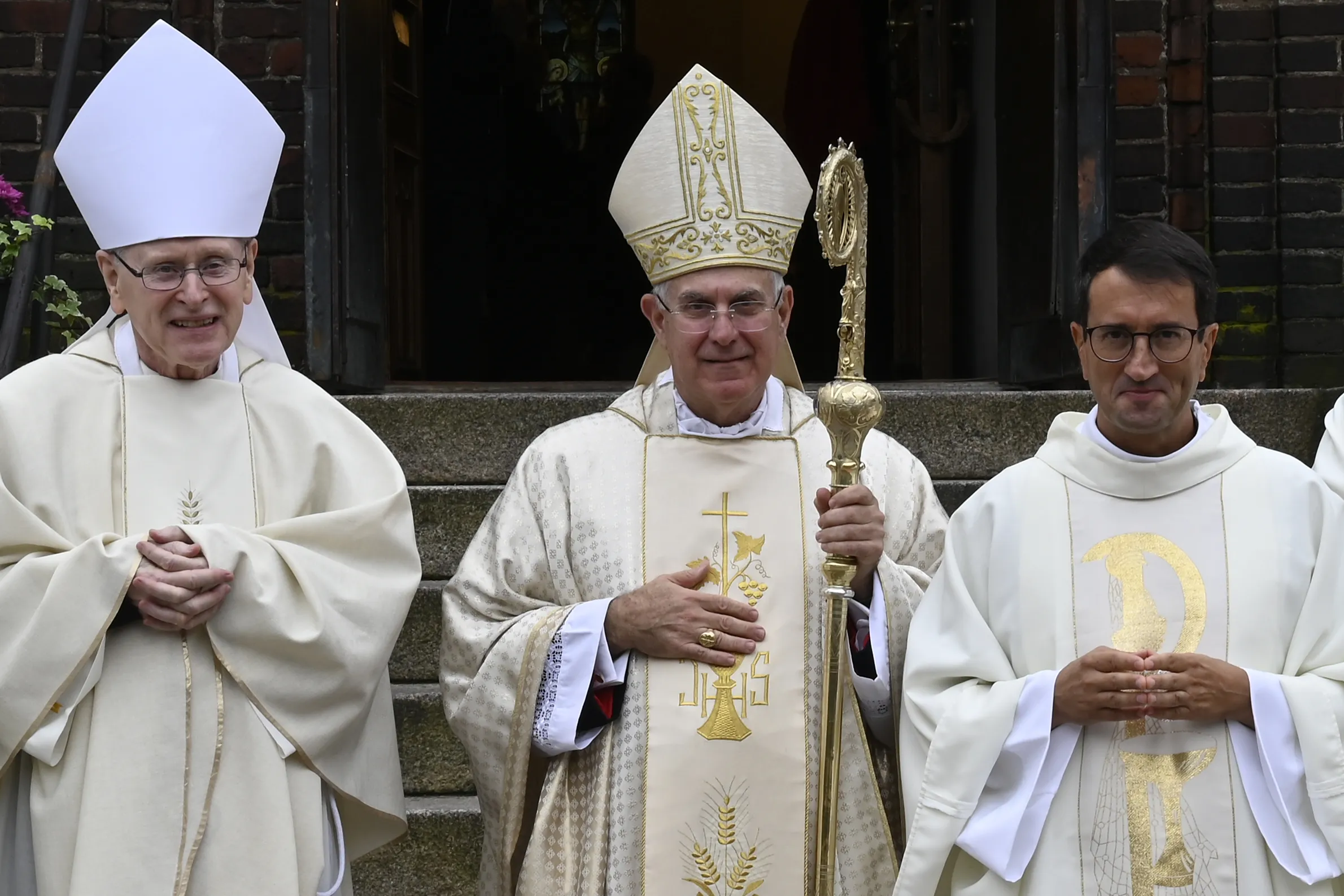
Rome Newsroom, Jan 22, 2024 / 13:00 pm (CNA).
Pope Francis received an ecumenical delegation from Finland on Friday, Jan. 19, on the second day of the Week of Prayer for Christian Unity and to mark the feast of St. Henry of Uppsala.
Speaking on the importance of ecumenical dialogue and providing a broader reflection on the saints and the important role their testament plays, the pope noted that “we are on a journey and our common goal is Jesus Christ.”
The pope told the Finnish delegation: “The saints are brothers and sisters who have traveled this road to the end and have reached their goal. They accompany us as living witnesses of Christ our way, truth, and life.”
“If the thousandth anniversary of the death of St. Olav in 2030 can inspire and deepen our prayer for unity and also our journey together, this will be a gift for the entire ecumenical movement,” the pope added in his address.
Following the meeting with the pope on Friday, the ecumenical delegation met with Cardinal Kurt Koch, prefect of the Dicastery for Promoting Christian Unity. Father Oskari Juurikkala at the meeting called the cardinal “a quite unique case that can be an example for others.”
Finland shares a border with Sweden, Norway, and Russia. It is home to some 5.5 million people, of whom an estimated 16,000 are Catholic, fewer than 1% of the population.
The Diocese of Helsinki covers the entire country and comprises just eight parishes and 25 priests, of whom most are foreign-born. Despite the small number of Catholics, the Catholic population of Finland grows each year, primarily from conversion and immigration.
After a four-year sede vacante in the diocese, following the resignation of Bishop Teemu Sippo, the first Finnish-born Catholic bishop since the Protestant Reformation, Father Raimo Goyarrola was appointed as bishop of Helsinki by Pope Francis on Sept. 29, 2023.

Goyarrola was consecrated bishop of Helsinki on Nov. 25, 2023, in the Johanneksen Kirkko (St. John’s Lutheran Church) in Helsinki.
Reflecting on his episcopal consecration, Goyarrola told EWTN in a recent interview that “it was amazing, it was an ecumenical feast. There were many Catholics, of course, but also many Lutherans, Pentecostals, Orthodox, Methodists, and Anglicans — we were like a council in the church.”
Ecumenism between the different churches is one of the defining features of the religious fabric of the country.
“Thanks to ecumenism, we use 25 different temples that are non-Catholic; they’re Lutheran or Orthodox churches. Every Sunday we use 25 [different non-Catholic parishes]; that means 25 different cities where [there is] Catholic Mass. But this is not a Catholic parish. And this is amazing. This is a gift. This is ecumenism in Finland,” the bishop continued in his interview with EWTN.
According to the diocese’s official website, the permanent Catholic parishes are located in Helsinki, Turku, Jyväskylä, Tampere (with chapels in Vaasa and Pietarsaari), Kouvola, Kuopio, and Oulu.
“A parish priest on Sunday will say three to four Masses. One Mass is in the parish, but another Mass is 200 kilometers from the parish, and perhaps the third Mass is 150 kilometers from the parish, and so we travel a lot by car, by train,” the bishop added.
Finland is a traditionally Lutheran country; however, in many ways, it retains unique links with the Catholic tradition that has made greater ecumenical dialogue possible.

Juurikkala, a native of Helsinki and a priest of Opus Dei in Rome, spoke with CNA about his journey toward the faith and the unique ecumenical atmosphere that characterizes the Church in Finland.
“In the last couple of decades, there has been a growing sense of friendship, especially between the Lutheran, Orthodox, and Catholic bishops, priests, and pastors,” he said.
Both for Juurikkala and Goyarrola the unique status and historical legacy of Finnish Lutheranism have facilitated greater dialogue and mutual intelligibility with Catholicism.
Noting that in Finland, the Protestant Reformation took the form primarily of a “political reformation,” Goyarrola said Finnish Lutherans “pray[ed] to the Virgin Mary, the saints, and there were tabernacles all around Finland more than 100 years after the Reformation.”
“The Lutheran Church in Finland is the closest Lutheran Church in the world to the Catholic Church,” the bishop added.
Juurikkala observed that the Catholic Church and the Finnish Lutheran Church also had a common “way of understanding the Eucharist and communion; it’s not so radically reformed in many other places.” He added that there’s also a “strong sense of the episcopal office,” which positions it “much closer to Anglicanism in that sense. It’s a strong sense of the episcopal office and kind of the church hierarchy and the notion of priesthood.”
Juurikkala grew up in what he described as a “humanistic family” where there was an emphasis on “humanities, literature, and culture,” but “there was really nothing, no Christian element in our life apart from the general, you know, Western culture.”
The Finnish priest noted that in Finland, especially during the 1980s to the early 2000s, “the Catholic Church was very invisible in the society.”
But, in the past 20 years there has been a shift in the Church’s presence in the Nordic country, brought in part by the advent of social media and the proliferation of the internet, he said.
“We see clearly in Finland that with the younger generations, there’s a lot of openness toward spirituality in general and interest in religions,” Juurikkala said. “There were some studies by some sociologists since in the last couple of weeks they published a study showing that the most religious group now in Finland is teenage boys.”
If you value the news and views Catholic World Report provides, please consider donating to support our efforts. Your contribution will help us continue to make CWR available to all readers worldwide for free, without a subscription. Thank you for your generosity!
Click here for more information on donating to CWR. Click here to sign up for our newsletter.




Leave a Reply